
Translating innovative health technologies from concept to market.
Welcome new senior lecturer Suélia de Siqueira Rodrigues Fleury Rosa. Read more about Translating innovative health technologies from concept to market.

When Marguerite Pacheco was in high school she was on the track team. Her events were the 800 meters, the one-mile run, and the two-mile run. During coverage of the 2012 Summer Olympics in London, Pacheco saw a commercial that explained why high jumpers all go over the bar backwards. The explanation made a lightbulb click on in her head. “Their center of mass actually stays below the bar when they flop over like that,” says Pacheco. “And it was mind-blowing to me to see that you could optimize sports performance using science. I immediately wanted to learn so much science that I could create a super athlete.”
She quickly outgrew the dream of creating a super athlete, but held on to the idea of using science and engineering to help people with debilitating illness. The first step toward this goal was to choose a school for her undergraduate studies. Pacheco’s mom went to Smith College in Northampton, Massachusetts and thought her daughter might really like it there as well. Pacheco took some convincing to even go and visit, but once she got there she was hooked.
Pacheco graduated from Smith with a B.A. in Biochemistry and a B.A. in Engineering. Even more importantly she also graduated with a new way of thinking about learning. “At Smith the faculty stress this idea of the ‘growth mindset,’ which for somebody coming from a more traditional school system that tracked people based on test scores and class grades was really freeing and inspiring.”
Carol Dweck, the Stanford University psychology professor who coined the term, says, “In a growth mindset, people believe that their most basic abilities can be developed through dedication and hard work—brains and talent are just the starting point. This view creates a love of learning and a resilience that is essential for great accomplishment.” Talking with Pacheco now, it is clear she has adopted this growth mindset to overcome internalized views of her own capabilities.
“I used to feel embarrassed if I didn’t know something,” says Pacheco. “But now I can feel humbled without feeling ashamed. Having a growth mindset made it so I could go to tutoring and talk to TAs and go to office hours and ask for help because I really just wanted to understand the material.” Pacheco says she also benefitted from being part of a cohort of students who were in a scholarship program for underrepresented minorities in STEM. “It was easier to admit I felt lost sometimes because we were all in it together. Often other people were feeling just as lost as I was and we could figure it out together.”
As an undergrad Pacheco was involved in several research projects. A particularly rewarding experience was the summer she spent at Cornell Weill Medicine as part of the Leadership Alliance’s Summer Research Opportunities program. “I had great mentors at Weill and my research project was surprisingly successful,” says Pacheco. “My P.I. and the grad student I was working with taught me so much about research, but also about what grad school is and how things work. I came away from that summer feeling like a Ph.D. was something I would want to do.”
During her four years as an undergrad, Pacheco met several Cornell students—both undergraduate and graduate students. In each case, says Pacheco, these Cornellians had a passion for what they were studying, but also a passion for something else. “They all seemed very intense and ambitious about their research, but also committed to activism or policy or something outside of just their research,” says Pacheco. “Oh, and they all were also really good at finding ways to play hard and have fun. So applying to Cornell was an easy decision.
Her visit to campus sealed the deal. “The faculty were all doing such interesting work and the students in BME are all just top-notch people who are so involved and so friendly,” says Pacheco.
She moved to Ithaca in the summer of 2019 and shortly after that joined the lab of Associate Professor Nelly Andarawis-Puri in the Sibley School of Mechanical and Aerospace Engineering. (Andarawis-Puri is also a Graduate Field Faculty member of the Nancy E. and Peter C. Meinig School of Biomedical Engineering.) Andarawis-Puri’s lab focuses on tendon biomechanics, repair, and regeneration. Pacheco is looking closely at the tendons of animals who are somehow able to heal tendon injuries without scarring. In humans, when tendon tissue is injured, the tissue that grows in to heal the injury does so in a way that is disorganized and leads to scarring and some loss of mechanical function.
Andarawis-Puri and Pacheco want to understand how the animals that can heal tendon injuries scarlessly are able to accomplish this. In these animals, new tendon cells proliferate, migrate, and remodel the tendon at the site of the injury. If researchers can understand which proteins are most responsible for these processes, then they may be able to create methods to scarlessly heal tendon injuries in humans, as well. “Basic science is important,” says Pacheco, “and I will never undervalue it. And at the same time we are really focused on being able to use what we learn to promote healing.”
Pacheco is halfway through Year Two of her doctoral studies in the Meinig School and her excitement about the work is evident as she describes what it is she is hoping to learn. It is clear the growth mindset is guiding her work. She is not embarrassed by what she does not yet know; she is excited to have the chance to figure it out.
When the world is not living under COVID-19 constraints, Pacheco plays soccer, boxes, and dances salsa. She is also a member of a Latinx Grad Student Coalition, and Vice President of the Cornell chapter of the Biomedical Engineering Society (BMES).